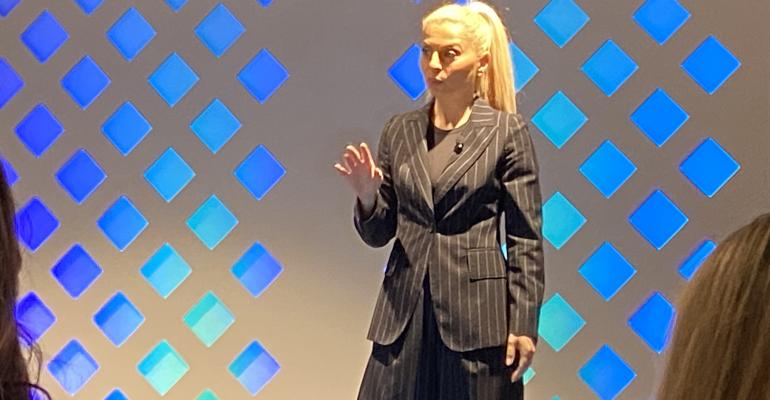When Evy Poumpouras takes the stage, she gives off a bit of a superhero vibe. That impression may come from knowing she served in the U.S. Secret Service for 12 years during the Clinton, Bush, and Obama administrations, both as an interrogator and in the presidential protection unit. But it also comes from her attitude.
Poumpouras’s confidence, strength, and positivity came through during her presentation at the Financial & Insurance Conference Professionals’ Winter Symposium. The event drew 99 registrants to the Hilton Boston Park Plaza on January 30 and 31 for networking, education, and inspiration, including her session, “Bulletproof Strategies for Leading Fearlessly.”
Her message was clear: You don’t need to be a boss to be a leader. “It’s who you are on the inside. It’s how you carry yourself in the world.” And to build a “human brand” that evokes leadership, two overriding qualities are needed, she said: warmth and competence.
People who are competent but lack warmth tend to butt heads with others. Meanwhile, those who are warm but lack competence elicit pity. She said that it’s the people who are both competent and warm that people want to follow.
Typically, planners must be competent, that is, knowledgeable, reliable, and skilled, to hang onto their jobs. But the qualities that define warmth—such as being open, approachable, and nonjudgmental—might be what they need to move up the ladder. And that was the focus of much of Poumpouras’s advice.
Among her basic but essential nuggets was to be a good listener. She noted the 80/20 rule of active listening, which says that in conversation, 80 percent of the time should be spent listening and just 20 percent of the time spent talking. This, she said, “leaves room for people to reveal themselves.”
Poumpouras also suggested remembering an acronym, TED, which stands for Tell, Explain, and Describe, to draw people out: “Tell me what you think about…, Explain what you mean by …; Describe how you…” These queries will not only help you understand what the other person is going through, but also establish connections that ultimately build trust.
Another simple but wise suggestion: When you’re speaking with someone, put your phone away. Don’t hold it in your hand. If it pings and you glance down, the message you send is that whatever is happening on your phone is more important than the conversation. One thing Poumpouras has noticed is that if you put your phone away, the other person probably will too.
Adaptability is another essential leadership skill, said Poumpouras, urging the audience to always take stock of the mindset of the person they’re dealing with. She illustrated her point by describing two extremes: the emotional, inward-focused person who has a strong need to be heard and the task-oriented, mission-focused problem-solver who wants to get right to the point. “You need know who you’re talking to, so you can meet them where they are. Sometimes, before you can have the conversation you want, you need to have the conversation they want.”
“It's okay to handle people; there's a way to do it without creating conflict,” Poumpouras added. “When you know who you're dealing with, what their mindset is, and also what your human brand is—how people see you—you can flow and adapt.”





